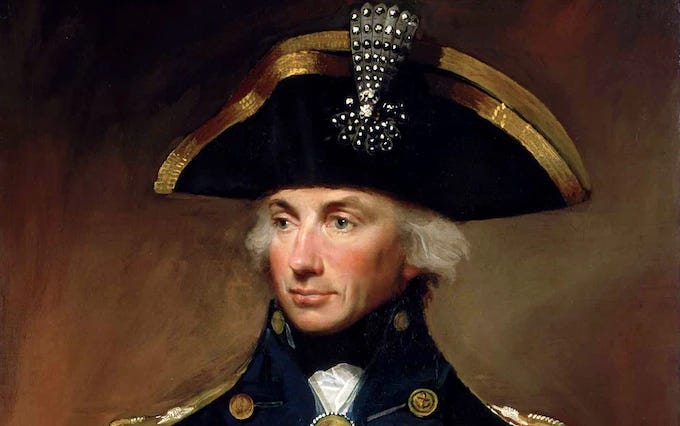Influences in Nelson's early career
"Forgive me; but my mother hated the French."
Horatio Nelson was born lucky.
Burnham Thorpe, Norfolk, where his father was the Rector, is three miles from the sea, an hour’s walk. The land lies flat and low and the wind from the North Sea comes racing through. He must have watched the sailing ships go past, to adventures, trading routes, battles, or to the harbour at Great Yarmouth. He must have seen the long horizon flecked with sail, busy with trade. More important than the stories told later about his young sense of honour and adventure, he grew up used to the smell of sea and the sound of waves, day-dreaming about where the ships were passing to, what they were like on-board. And so, aged twelve, he went to find out. “I went to sea with my uncle, Captain Maurice Suckling”.1
His father was a poetic man. When one of his daughters turned twenty-one, Edmund Nelson said to her that time was “a subtle, nimble thief” who has “stolen away your one and twentieth year”, a clear echo of Milton’s sonnet, which begins, “How soon hath Time the subtle thief of youth/ Stoln on his wing my three and twentieth year!” That sonnet is quite apposite to the life of Nelson. “My hasting days fly on with full career,” Milton writes, in a line that fits perfectly the rapid fullness of Nelson’s life: to sea at twelve, to the arctic at 15, made lieutenant at 18, full Captain at 21. Despite his prodigious rise, he always looked ahead. He knew that time was running out.
Milton’s sonnet begins in despair: “my late spring no bud or blossom shew’th.” Nelson was capable of depression. But he shared Milton’s ambitious nature. Writing aged twenty-one, when debilitating illness had him sent home from his service, he said, “I shall recover my dream of glory and be fulfilled.” That dream had come not just from living by the sea, but from his family.
Nelson’s mother Catherine died when he was nine, followed by his grandmother a few days later. He was strongly influenced by his mother for the rest of his life. Writing in 1803, two years before his death, he said,
I assure your Excellency, that I would not, upon any consideration, have a Frenchman in the Fleet, except as a prisoner. I put no confidence in them… I believe they are all alike… not a Frenchman comes here. Forgive me; but my mother hated the French.2
This chauvinistic patriotism is characteristic of Nelson. But so is the sentimentality of thinking of his mother while writing an official letter. He was a passionate, heartfelt sea officer, and a very personal one. Writing in 1804 to the brother of the man who’d been a Rector at Burnham, Nelson said, “I shall never see dear, dear Burnham again; but I have a satisfaction in thinking that my bones will probably be laid with my Father’s, in the village… the thought of former days brings all my Mother into my heart, which shows itself in my eyes.”3
His mother influenced Nelson’s life in more than this. The Sucklings were well-connected. Catherine Nelson was distantly related to the Walpole family, also from Norfolk. (Robert had been Prime Minister, 1721-1742.) The other branch of her family, the Sucklings, produced soldiers, including the Cavalier poet Sir John Suckling. Maurice Suckling’s career had been supported by the patronage of Robert Walpole, who also helped set up Nelson’s father in the rectory at Burnham Thorpe. Uncle Maurice’s patronage did much for Horatio’s career.
Nelson’s career was guided by his uncle from the beginning. He began a year earlier than those without a service relative could start. The rules stated he needed six years’ experience, but there was little proper experience available when he joined in peacetime, so his uncle sent him on a merchant vessel, to teach Nelson deep-sea sailing—and all the while, his uncle kept him on the books in the navy, not an uncommon trick, but a very useful one. He also lied about Nelson’s age, enabling the young officer to take the lieutenant’s exam early, again, not an uncommon ploy.
Nelson was also born at the right time. The military historian N.A.M. Rodger wrote that “for the future sea officer, the most important means of ensuring a successful career was to be born at the right moment, ideally about twenty years before the outbreak of a major naval war.” Nelson was born in 1758. His first battle came in 1775. Two years later he became an officer. Then, between 1777-1779, he participated in the American War of Independence, which started some twenty years after he was born. In 1777, he was a second lieutenant; the following year, war broke out with France, which meant more opportunity; in 1779 he became a Captain, the highest he could get through talent and influence. He was twenty-one.
Nelson was lucky in one final way. Starting young was normal for officers’ relatives. Children as young as eleven were on-board Navy ships. It was common for them to play on the rigging. Nelson himself was jolly and kind to children, racing them up the rigging to help them overcome home-sickness and sea-sickness. But these children were also part of the Navy drinking culture, and would sometimes play on the ropes after drinking at dinner. It was in this way that a lieutenant on the Grampus in 1787 saw his son, who had drunk a glass of wine that evening, fall out of the rigging, landing at his father’s feet, quite dead.4
Sketch of my life, D&L, vo. I, pp. 3-4
D&L, V, p. 237, to Eliot, 8/10/1803
D&L, VI, p. 18, to Doctor Richard Allott, 14/5/1804
Command of the Ocean, p. 394



...and there was that incident in the attack when he escaped from a polar bear when the ice floe broke up. As if he were being protected to fulfil his destiny.